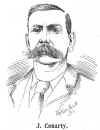and says he is a wheel horse in Grant township yet.
 Jack Conarty was born June 3,1844; was married to Anna Atterbury February 2, 1878; they have had five children, four of them still living, three girls and one boy whose name is Pat.
Jack Conarty was born June 3,1844; was married to Anna Atterbury February 2, 1878; they have had five children, four of them still living, three girls and one boy whose name is Pat.
Jack volunteered in company K 30 Wisconsin, mustered out in 1866; was elected sheriff on Leota ticket in 1877; defeating Charles W. Posson by one vote.
He was defeated for the nomination in 1879 in the Republican convention by Jim Vining but was an independent candidate at the polls but failed to get votes enough.
During Jack's term as sheriff he arrested the men charged with the murder of John Landis by his zeal and fearlessness in connection with the arrest of Dr. Cummings and
others. At that time he incurred the displeasure of the Leota partisans which probably cost him a re-election as sheriff.
He joined the populist party in 1890 was a candidate for sheriff on that ticket in 1893, but was defeated by Wm. Burnham.
He resides on Cactus Creek at this time on the old Tom Atterbury farm.
Ed Conarty came here with Pat and Jack; was married to Elizabeth Slater in 1878; they have nine children; left here in 1889.
He now resides in Union, Oregon.
Joseph Conarty came here in 1884: was married to Miss McFarland in 1886; they now live in Sand Creek township; have three children.
Maria Conarty was born in July 1860; she married Charles Moore and now lives in
Cheyenne county.
Thomas Francis Conarty was born in 1862 and lives in the eastern part of the county.
Mr. Conarty's other two children Mary and Felix, died in infancy.
The capture and escape of Dutch Henry also occurred while Jack was sheriff.
Henry was a desperado, had followed the plains for some years and had murdered a man for his money at Julesburg, Nebraska, he had also killed a man in a drunken brawl at Dodge City.
In the spring of 1878 while at Kearney, Nebraska, he made the acquaintance of a young man named Hulett from Gloversville, New York.
Hulett had just arrived from the east and was in search of employment; Henry prepared to take him on a wild horse hunt, assuring him that there was plenty of money to be made in the business.
They came to
Rawlins county, Kansas, and there stole some horses from the cattle men and settlers, Henry representing to Hulett that the horses were strays and public property.
They returned to Kearney with the stolen horses, but had not been there long when sheriff Anderson of that place saw a notice of reward for them, which the people of Rawlins county had published.
About the same time Mr. Steiner of Rawlins county came here and had warrants issued for Henry and Hulett.
About this time sheriff Anderson of Nebraska, after a hard fight in which he shot Dutch Henry through
|